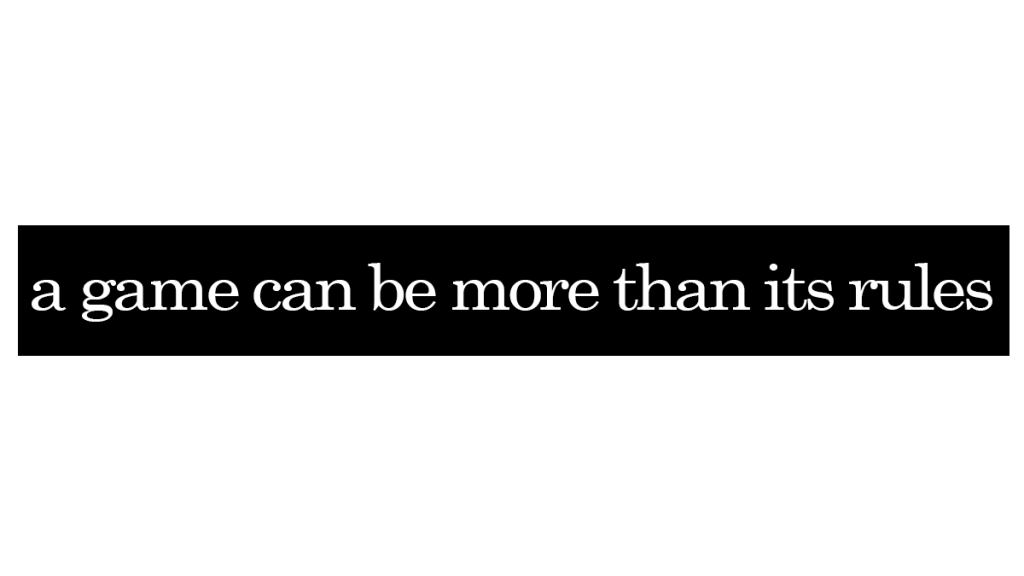I don’t feel like I think about games the same way a lot of other people do. It’s rare that I see a theory-essay about tabletop games that I agree with, at least. I feel like there’s a dominant way to talk and think about games (if you’re not a 5e stan) in the indie TTRPG scene and I don’t feel represented by it. And I single out 5e stans because I won’t engage with them. Their arguments about “rule of cool” or “rulings vs. rules” don’t matter to me. They’re almost always arguments about continuing to play/support 5e, which I am against on a level outside of game systems. I oppose it on the basis of not supporting a company with a history of shit behavior like WotC.
With that out of the way I want to say that I think system matters. But I think the way in which they matter is an even more interesting question. And I want to put forth an argument for a way in which a game system can matter. I also want to say that I think there are a lot of different ways a game system can matter and, also, I think THAT’S the more important and productive conversation than simply “do they matter or not?” We should try to talk about the ways in which they can matter.
Anyways—
I think an interesting way to think about game systems and their rules is that they put focus on the aspects of the game that are uncertain.
I like to play dungeon crawlers and I think there are a lot of important people working with and in dungeon-crawl-games. People who are working to unravel the xenophobic bullshit of a mister Gygax. People who are from all walks of life and from many flavors of marginalized, who are doing the work necessary to reclaim dungeon crawlers from that legacy. Much like people have done with the legacy of Lovecraftian horror in the wake of all the abhorrent ideas that is mister Lovecraft.
I was talking to a friend recently about their TTRPG they are working on and they said something that made me rethink my relationship with dungeon crawlers but also game texts. They said that their game only has rules for fighting because that’s the only area of the character’s lives that is uncertain. That’s the only part of their life left up to the divination of the dice.
All the other aspects of the game were simply part of the conversation. They were certainties that didn’t need to be mechanized with rolls or stats. The characters can simply Do Things and those things were part of the greater conversation of the games, but always looming in the background was the idea that when it came to fighting, the outcomes were uncertain.
It made me think about the dungeon. The underworld. The otherworld. Whatever you want to call it. And how a dungeon crawler might have page after page of rules detailing the minutiae of delving into dangerous places and fighting monsters, but how a lot of a game, at least when I run it, is spent outside of the dungeon. Talking. Living life. Maybe even a little romance.
There aren’t pages of rules to mechanize talking to NPCs or finding a place to sleep. And it’s not because the game doesn’t contain that stuff or care about that stuff while it’s being played. It’s not because the game isn’t about that stuff. It’s because those moments aren’t uncertain.
I’ve always struggled with the adage that “a TTRPG is a conversation.” Maybe because it was never properly explained to me or maybe because I saw it as a throwaway line in so many mid-2010’s games that it lost all meaning. But thinking about it in this lens has made me understand it much better.
The conversation of a game is exactly that. It’s the parts of the game that are talked through and about. Important role-playing moments that affect characters and their internal lives. You know, the RP part of the RPG. If I am sitting around a table, playing a dungeon crawler, and not rolling dice, I am still roleplaying. I am still actively playing the game.
And that conversation continues until things become uncertain and you gotta bring in the character sheet and the numbers and the dice to solve The Uncertainty.
It makes me think that a character sheet is like a constant reminder of that uncertainty. You’re in town chatting up this cute boy in a tavern and glance over to see that you have 16hp and you think “oh damn, that’s not really a lot. Am I going to be okay when I go into the dungeon again?”
Maybe a game system matters because they show you what matters to the characters. It’s what keeps them awake at night.
Moving away from the dungeon, in Monster Hearts, the uncertainty is about teenage-dom and getting through another high school day while you’re a monster. The uncertainty is if you can position yourself to get strings on others or if you can avoid having to do anything too embarrassing based on your strings.
You look at your character sheet in MH and these are the things that are at the back of your character’s mind. At all times.
I don’t know if this way of looking at games will work for every game, or for everyone, but I think it’s interesting and excites me. More than that I hope we can start having conversations about the different ways game systems can matter and stop rehashing the useless “do they matter or not” arguments.
I also understand the dominance of 5e/DnD within the TTRPG space, but I don’t really feel the need or want to engage with those stans on the level of TTRPG theory. Like I said above, I think all of their arguments are just ways for them to continue to support a shit company that I disagree with for reasons outside of game system. I want to talk about TTRPGs with people who aren’t just making excuses for bad businesses.



One response to “A Game Can Be More Than Its Rules: Part 1”
[…] wrote a blog yesterday with the tagline “A game can be about more than its rules.” I think I was processing […]
LikeLike